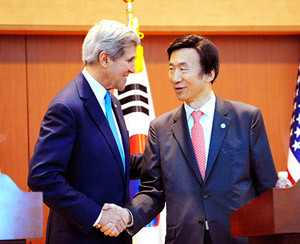Philip Baxter
September 17, 2015
The following is an excerpt of an article originally published by Science and Diplomacy on September 16, 2015.

US Secretary of State John Kerry and South Korean Foreign Minister Yun Byung-se wrap up a joint news conference in Seoul on May 18, 2015.
On April 22, 2015, the United States and the Republic of Korea (ROK, also known as South Korea) signed a new bilateral civilian nuclear agreement known as a 123 Agreement, a prerequisite for cooperation and trade in nuclear technologies and resources, after previously being unable to reach an agreement in 2014. With the new agreement, the United States has opened, however slightly, the door to allowing South Korea to expand its nuclear operations, with implications for future nonproliferation efforts. This paper reviews why this has been a point of contention, the technical issues at stake, the implications for U.S. approaches to 123 Agreements, and the potential strategic consequences for the Korean Peninsula.
[…]South Korea’s increasing domestic usage of nuclear power, its desire to play a larger role internationally with nuclear power servicing and plant construction, and the limited space available for long-term spent fuel storage have all been employed in arguments to promote South Korea’s case for enriching or reprocessing domestically. This has been a continuous point of contention in U.S.-ROK negotiations and torpedoed the ability of negotiations in 2013 and 2014 to lead to a new agreement. Fundamentally, the 123 Agreement between the United States and South Korea denies all ENR activities by South Korea. Yet South Korea perceives ENR as critical to meeting its strategic objectives and energy security needs. Further, the country’s desire to become a major international producer and service provider in nuclear energy is a critical issue and elevates the importance of acquiring a capacity to enrich, fabricate, and reprocess nuclear fuel. In particular, South Korea desires the ability to use a reprocessing technique called pyroprocessing because it can reduce waste volume and allow for fuel to be recycled.
South Korea wants to expand its ability to conduct operations within the full spectrum of the fuel cycle, necessitating preapproval, or advance consent, from the United States under the 123 Agreement.
Read the full text of the article at Science and Diplomacy.
